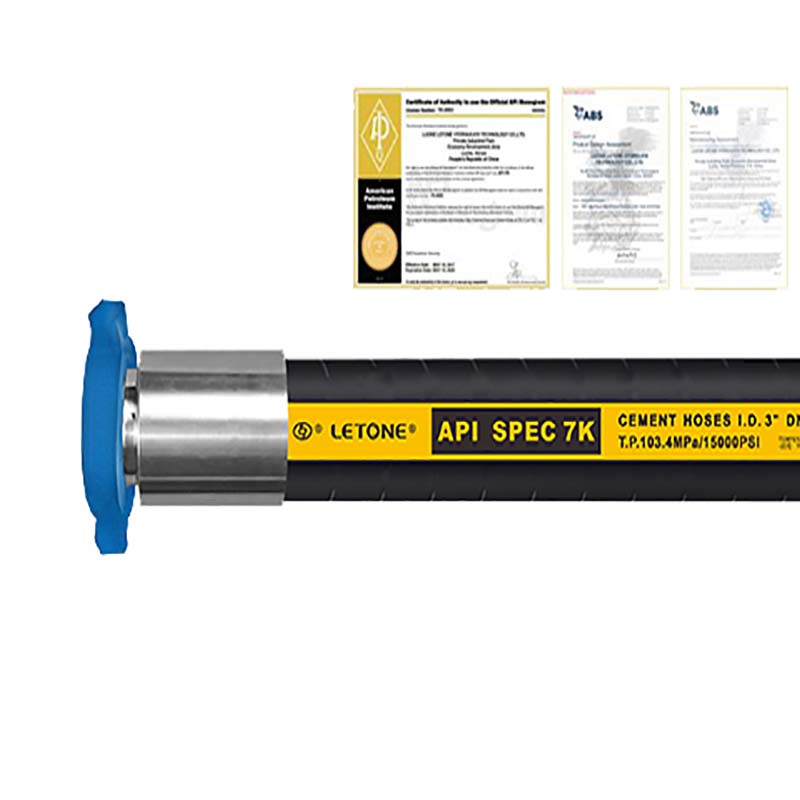
High pressure conveying pipe for oil specific API hose drilling equipment
In the modern oil extraction industry, the development and utilization of oil and gas resources cannot be separated from high-quality oil pipelines. Especially in the drilling and oil extraction process, API certified high-pressure corrosion-resistant oil pipelines have become an important tool in the industry. This article will delve into the characteristics, applications, technical parameters, and maintenance of API certified oil drilling and production hoses, helping relevant enterprises and practitioners better understand and use these high-quality pipeline products.
The Importance of API Certification
API (American Petroleum Institute) certification is one of the quality standards for equipment and materials in the petroleum industry. It ensures strict quality standards are followed in the design, sales, and installation of equipment, which is crucial for ensuring the safety and reliability of oil drilling and extraction operations. Petroleum drilling and production hoses that meet API certification typically meet high industry standards in raw material selection, production processes, and final inspection.
Characteristics of high-pressure corrosion-resistant oil pipelines
1. High pressure resistance performance
In the process of oil drilling and extraction, pipelines often need to withstand internal pressures of up to thousands of psi. In order to function properly under such harsh conditions, API certified oil pipelines typically use high-strength materials such as alloy steel, nickel based alloys, or specialty plastics. Through rigorous design and testing, these pipelines can easily cope with the pressure challenges brought by extreme environments such as deep water and wells.
2. Corrosion resistance
Petroleum and its derivatives are prone to corrosion of pipelines during long-term transportation. Especially for crude oil containing acids, sulfides, and other corrosive liquids, if the pipeline is not effectively protected, it will accelerate aging and rupture. Therefore, API certified oil pipelines often use special anti-corrosion coatings or alloy materials, significantly reducing the probability of corrosion and extending the service life of the pipeline.
3. Flexibility and durability
Oil drilling and production pipelines not only need to withstand pressure, but also need to have a certain degree of flexibility to adapt to the complex environment of underground operations. These pipelines adopt advanced production processes to ensure high bending performance while maintaining pressure bearing capacity. Through rigorous toughness testing, API certified hoses can maintain excellent physical properties even in extreme environments, reducing the risk of breakage and wear.
application area
API certified oil drilling and production hoses are widely used in the drilling and transportation of various types of oil and natural gas. Here are some of the main application areas:
1. Offshore drilling operations
In offshore platforms, oil pipelines need to withstand extreme mechanical pressure and corrosive environments. In this case, API certified high-pressure corrosion-resistant oil pipelines provide support to ensure the safe and reliable transportation of crude oil from the seabed to the platform.
2. Deep well drilling
Deep well drilling operations typically face high pressure and complex geological conditions. Using API certified oil pipelines helps to enhance overall operational safety, reduce the risk of equipment failure, and improve drilling efficiency.
3. Inland oilfield operations
Even in inland oil fields, the corrosion resistance of API certified oil pipelines cannot be ignored. For environments with corrosive media, such as high water cut oil fields, selecting appropriate oil pipelines is also a key factor in ensuring production efficiency and equipment durability.
Technical Parameter
Here are some common technical parameters for API certified oil drilling and production hoses:
-Pipe size: Common pipe sizes range from 2 inches to 12 inches, and can be customized according to job requirements.
-Pressure resistance level: The pressure resistance level of oil pipelines usually ranges from 500psi to 5000psi, and users can choose the appropriate model according to their actual working environment.
-Materials: Common materials include carbon steel, stainless steel, and composite materials, each with unique performance advantages in different environments.
-Temperature range: API certified oil pipelines can adapt to a wide range of temperature changes from -40 ℃ to 100 ℃, meeting the needs of use under different climatic conditions.
maintenance
In order to ensure the long-term safe operation of API certified oil drilling and production hoses, maintenance and upkeep are particularly important. Here are some basic maintenance suggestions:
1. Regular inspection
Regularly inspect the appearance of pipelines, with a focus on whether there are obvious signs of wear, cracks, or corrosion. Once an abnormal situation is detected, it should be replaced or repaired immediately.
2. Cleaning work
Keep the pipeline clean to prevent impurities from adhering. Especially during the transportation process, the interior of the pipeline should be regularly cleaned to prevent blockages and other potential issues.
3. Correct operation
When using oil pipelines, please follow the instructions to avoid overloading or improper operation. Regularly train operators to increase their awareness of equipment maintenance.
conclusion
API certified oil drilling and production hoses play an indispensable role in the modern petroleum industry due to their high pressure resistance and corrosion resistance. By selecting high-quality oil pipelines that meet industry standards, enterprises can not only ensure the safety and efficiency of operations, but also stand undefeated in fierce market competition. A deep understanding and appropriate use of these pipeline products will lay a solid foundation for the sustainable development of the oil extraction and transportation industry.